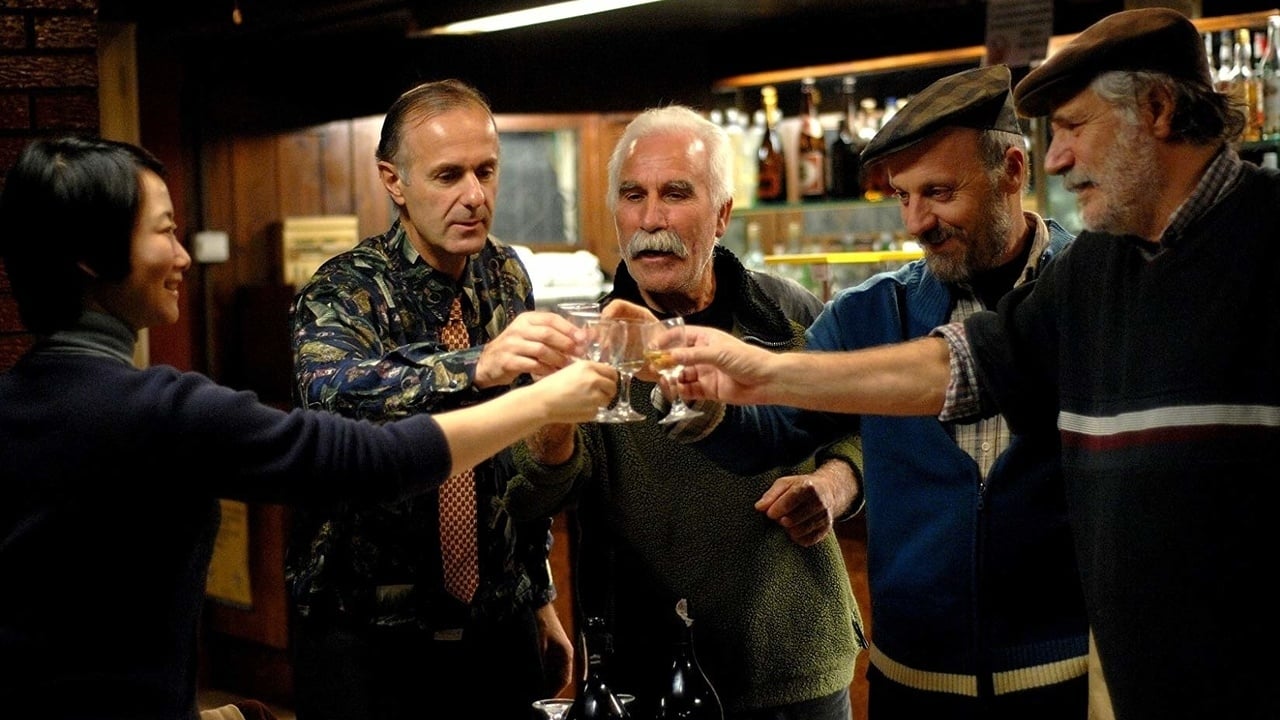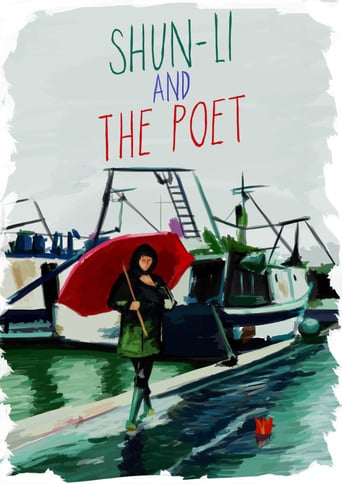Perry Kate
Very very predictable, including the post credit scene !!!
Mjeteconer
Just perfect...
Stellead
Don't listen to the Hype. It's awful
Fleur
Actress is magnificent and exudes a hypnotic screen presence in this affecting drama.
gummo_rabbit
A tender, sympathetic movie with imagery that is not spectacular but that will leave a great impression. The story – of a unique friendship across boundaries of culture and language – develops at a moderate pace but takes a dramatic turn in the end.In all of this, the elements water, wind and fire play an important role, just as they did in the ancient Chinese poetry which runs as a thread throughout the film. Especially the element water. Water reflects and carries anything that will float. Water connects and separates. Water holds fish, a source of livelihood. And how do you sustain that, what do you do with the means of life you are given? It's one of the questions the film gets you thinking about. The opposite of water is fire and you will need to see the film for yourself to find out how fire is put to full dramatic use. And then there is the wind, which has the unique quality to bring us closer to a loved one far away. The elements are of course universal, as are friendship and love - the main themes in this story of immigrants.Parenthood is another theme. It really got me thinking, having no children myself but being a proud uncle, what it must feel like to be a parent. For Shun Li, one of the two main characters, it is a source of great joy, but also of tears as she is separated from her son. Unfortunately not everyone is as grateful to be a parent as Shun Li, as we see in a striking scene with one of the main guests of the café.Apart from being a poetic film about friendship, parenthood and the elements around us, it also tells us about sacrifice and how all acts are connected. This is shown through the role of Lian, the roommate of Shun Li. Lian is most often seen performing tai chi movements on the beach. Tai chi is an ancient Chinese form of martial arts for balancing body, mind and spirit. It is a way of getting in touch with the world around you and all the lifeforms in it, close by and far away. Lian is a silent figure but her final act proves to show her understanding of the way that all life and all deeds are connected.It's a film about poetry where poetry becomes life, which is the main feature of great art.
David Crowe
This is not the romantic Venice. A bar where the patrons run up tabs because they don't have cash. The wet and grey docks. The relationship between the young Shun Li, an immigrant from China, and the old Yugoslav fisherman, is not one that many people can accept, not even the friends of the fisherman, and the much younger Chinese woman, working like a slave to bring her son from China to Italy. Two people who are very alone find each other and it's beautiful. How can it end well? But like the gritty beauty of the side of Venice the tourists don't see, there's a beauty to the love that cannot be. The beauty of the relationship is that when two people find that they can understand each other, the relationship is a rainbow that shatters the grey sky of their dull and friendless lives. They cling to each other. They become everything to each other. Even though they both know it is impossible.
bsholley
With tears in my eyes and thunder in the background, the movie ends.A young Mainland Chinese woman has somehow emigrated to Italy where she works in a factory, a café, and another factory. The story focuses on her stay at the café in a fishing village just south of Venice. The community in the village is the primary backdrop, and creates the tension between the residents and the Chinese. In particular, she meets a fellow immigrant who is considerably older than she, with whom she develops a unacceptable (according the the community) friendship.Some of it is so beautiful to look at that I am not sure of the significance, only the sensation of transformation. Even in factories, sleazy streets, fights, and fishing huts, we appreciate not only the reality but also the spirit of the scene.Maybe I have seen too many crime movies, but I was certain that her work for the freedom of her son was a scam, especially because she was moved several times, threatened with "starting over", and cloistered. Her friendship with Bepi was lovely, yet disallowed. Why? we ask. So little support was offered my work-mates. Why does this program even exist if there is so little personal concern?Lian, the roommate was another interesting character. She seems as emotionless as Shun Li and seems to have comfort in Tai Chi, thus enabling her to provide some care to Shun Li. It appears she did have deep feelings or else a very powerful sense of loss that remains unexplained. The film was education, it was touching. It was lovely and it was sad.
guy-bellinger
No one on earth can understand an immigrant better than another immigrant. A truism for sure but which has seldom been illustrated so well as in "Io sono Li" (Li and the Poet), the first fiction film of Italian documentary maker Andrea Segre.Immigration is embodied here by two complementary figures, Shun Li and Bepi.Shun Li is a young Chinese woman who has succeeded in emigrating to Italy, without her son (whom she sorely misses) but with a debt to pay back to the illegal network that "helped" her to get there.Bepi, on the other hand, is an old retired fisherman and amateur poet who left Yugoslavia for the little laguna town of Chioggia thirty-five years before. Both will meet in the osteria (bar-restaurant) where Li works as a replacement barmaid and of which Bepi is a regular and a touching if difficult relationship will develop between them.That is all there is to this film in terms of narrative, but "Io sono Li" does not need a strong plot to manage to exist. This delicate gem actually delivers much more than its story : a fine description of a rarely shown little town in the Venetian Lagoon, an attack against illegal emigration network, a criticism of intolerance and, best of all, the sensitive portrait of two engaging loners wonderfully played by Tao Zhao (the muse of director Jia Zhangke) and Rade Serbedzija (the Croatian actor who played the bio-chemical expert in "Mission Impossible: II). When you leave the theater you understand "Io sono Li" is a real achievement.It has all the virtues of a documentary without being dryly factual.It is moving, even very moving as the film comes to its close, but without resorting to cheap tear-jerking tricks.It is an involved work but its commitment is discreet and remains in the backgroundTo make a long story short, 'Io sono Li' is a remarkable first feature that should not be missed.

